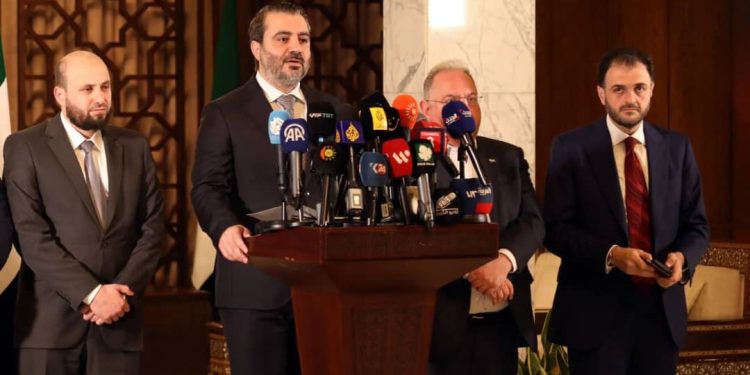Syria and Qatar have reached a series of sweeping agreements to deepen cooperation across five essential sectors, following a high-level visit to Doha by a Syrian government delegation headed by Foreign Minister Asaad al-Shibani. The visit, which marked a major diplomatic milestone in Syria’s regional reintegration efforts, reflects what Syrian officials describe as a “new foundation” for bilateral relations—anchored in dialogue, mutual respect, and shared interests.
A Broad-Based Vision for Cooperation
Speaking at a press conference in Damascus after his return from Qatar, Shibani confirmed that the two countries agreed to strengthen collaboration in energy, finance, tourism, telecommunications and technology, and healthcare—while also expanding into education and private investment.
“This visit is a realistic step toward strengthening joint work based on mutual interests,” the minister said. “We reaffirm our commitment to positive engagement with all regional partners who genuinely support Syria’s stability and reconstruction.”
Energy: Gas and Technical Coordination
In the energy sector, both sides agreed to continue the delivery of Qatari natural gas to Syria through Jordan—a key initiative originally launched in March to help address Syria’s chronic electricity shortages. They also pledged to enhance cooperation in oil and gas development, including plans for future technical meetings with leading global energy companies.
Finance and Economic Integration
On the financial front, Qatar will begin providing interbank services for Syrian financial institutions in Qatari riyals. This move aims to gradually reconnect Syria with the global financial system. The long-dormant Syrian-Qatari Holding Company will be revived to serve as a credible investment platform, with a Qatari economic delegation set to visit Damascus later this month to explore high-priority projects.
Qatar also committed to offering technical support for Syria’s economic and fiscal reform agenda—through knowledge-sharing, training programs, and assistance in negotiating settlements with international lenders.
Syrian officials revealed that a joint investment forum will soon be organized to bolster partnerships between private sector actors in both countries, a development Shibani hailed as “an engine for sustainable reconstruction.”
In telecommunications, the agreement includes support for Syria’s aging infrastructure through Qatari partnerships in roaming services, fiber optics, and satellite communications. Syria will also benefit from Qatari support for entrepreneurship and innovation, with new incubators, accelerators, and venture funds planned. Follow-up meetings to develop these initiatives are scheduled in Damascus later this month.
Healthcare and Humanitarian Relief
Qatar pledged to restore and fully equip three major hospitals in Syria, operate them for three years, and provide ambulances and medical equipment for emergency use. A new modern hospital will also be constructed with Qatari support as part of a long-term strategy to rebuild Syria’s healthcare system.
Syrian authorities also secured partnerships with Qatar Charity, the Hamad bin Jassim Foundation, and the Qatari Red Crescent, which will contribute medical equipment, rehabilitate health centers, and deliver aid by land and air. Discussions are underway with Mohammed bin Hamad Holding to build pharmaceutical factories to meet domestic medical needs.
The University Heart Hospital in Damascus will be renovated and supplied with new equipment as part of these health-related agreements.
Tourism, Trade, and Connectivity
Tourism emerged as another key area of interest. The two sides agreed to share expertise in electronic visa systems, co-manage select government-owned hotels, and cooperate with Qatar Airways to promote Syria’s tourist destinations. Qatari business leaders expressed readiness to invest in Syria’s hospitality and tourism sectors.
These efforts will complement a broader push to rebuild Syria’s trade and commercial networks, with new proposals discussed to enhance bilateral trade and business relations.
Political Grounding: Sovereignty and Stability
Politically, Shibani reaffirmed Syria’s unwavering commitment to national sovereignty, territorial unity, and non-interference in internal affairs. He welcomed Qatar’s renewed affirmation of Syria’s independence and its support for the Syrian people’s aspirations for a dignified life under effective state institutions.
In a regional gesture of goodwill, both Qatar and Saudi Arabia recently announced a joint financial aid package to cover three months of public sector salaries in Syria, emphasizing their commitment to stabilizing the war-torn country and alleviating humanitarian pressures.
Al-Shibani concluded by describing the visit as a turning point: “Syria extends its hand to all who seek a genuine partnership in recovery and development. Qatar has proven to be a reliable ally and a sincere partner in our national recovery.”
The agreements signal not only the revitalization of Syrian-Qatari ties but also a broader recalibration in the region’s diplomatic landscape—where reconstruction, sovereignty, and shared prosperity are becoming new guiding principles for engagement.
This article was translated and edited by The Syrian Observer. The Syrian Observer has not verified the content of this story. Responsibility for the information and views set out in this article lies entirely with the author.


